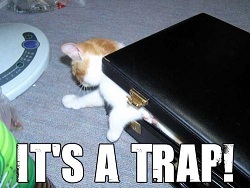License to Rube
 This is a hard world we find ourselves in, where everyone is looking to steal our money, screw us over, and make wee-wee on our hats. This is a world that hates and punishes naiveté, and loves and rewards cynicism and suspicion. Trust no one and fear everyone, strike before you’re struck, an extended hand conceals a blade, the arm around your back connects to the hand in your pocket. It’s an unfortunate reality, but this is a perfectly sensible reaction to this world, so slimy full of realtors, spammers, lawyers, and liars.
This is a hard world we find ourselves in, where everyone is looking to steal our money, screw us over, and make wee-wee on our hats. This is a world that hates and punishes naiveté, and loves and rewards cynicism and suspicion. Trust no one and fear everyone, strike before you’re struck, an extended hand conceals a blade, the arm around your back connects to the hand in your pocket. It’s an unfortunate reality, but this is a perfectly sensible reaction to this world, so slimy full of realtors, spammers, lawyers, and liars.
Sadly, we carry our real-world wounds into the games we play, which transforms our characters, first imagined as sweetly smiling pure souls with cartoon birds lighting on their shoulders, into gritty, hard-bitten, heartless, soulless bastards. This may be because of experiences with a DM that shattered hope and trust like a cinderblock on a crystal ornament, and we have decided we cannot allow ourselves to be hurt like that again.
Players who are young (figure under 14 years old) or brand new to gaming can be unspoiled by distrust and doubt, which means they might actually release the defeated kobold chieftain, and might actually touch the faintly glowing altar in the middle of the cobwebby temple, and might actually believe the exotic beauty needing an escort back to her underground city. The paragon level cynic cries, “Kill the chieftain! Avoid the altar! Ignore the beauty!” Each of these situations is obviously a trap.
And here’s my question: So what?
When I first started gaming (many lifetimes ago), when I was young and dumb and full of… um… foolishness, I regularly blundered into regrets and traps and betrayals, and these were in games riddled with DM statements like, “The room appears empty,” and, “The wardrobe appears safe,” and, “The woman appears honest.” Naturally, all of those “APPEARS” rang my alarm bells, but I still got caught, hurt, nailed, and crushed.
Every villain that got away always came back, more dangerous, better equipped, and insane with the need for revenge. Every time I didn’t obsessively prod the floor with a 10′ pole, I fell into a deep pit with poisoned spikes at the bottom. Every femme I trusted turned out to be extremely fatale, usually working with the escaped villain and often the architect of all those spiked pits.
And despite all that pain, despite all those times I was burned, I had some real fun in those way-back-when games. I am so careful and worried and neurotic in the real world, I could really enjoy being reckless in a fake one, rushing ahead, devil may care, and let’s see what happens. I’ve seen it in so many games, where the party is skulking fearfully around a chest as though it were an unexploded bomb (which sometimes, it is), and then somebody grunts, “Ah, screw it,” and kicks the chest open. In the moment that this happens, there’s always a look on that player’s face, a look of relief, a look of release, a look of freedom.
 What I’m calling for here are more “Ah, screw it” moments. And why not? What is at risk exactly? I’ve placed several of my characters in dangerous circumstances, and even watched sadly as a few of them died, and outside of some mild razzing from other players, I never personally suffered from the outcome. The DM often rewarded such brash action, or, failing that, didn’t overtly punish it. Usually, I wound up with a funny, wild, loopy story with which I could bore friends and family for years afterwards.
What I’m calling for here are more “Ah, screw it” moments. And why not? What is at risk exactly? I’ve placed several of my characters in dangerous circumstances, and even watched sadly as a few of them died, and outside of some mild razzing from other players, I never personally suffered from the outcome. The DM often rewarded such brash action, or, failing that, didn’t overtly punish it. Usually, I wound up with a funny, wild, loopy story with which I could bore friends and family for years afterwards.
Happy Ending Example: In a post-apocalypse game, our group was under assault by metal-heads inside a sprawling mansion, and Steve and I needed to get across a wide hallway that ran north-south along the mansion’s spine. We knew there were leather and spiked killers waiting for us to show our faces, so there we were, crouched and dithering inside the laundry room. Finally, I stood up, turned to Steve and said, “Cover me,” and made my dash. I was two strides across the hallway when a metal-head leaned from a nearby room, leveling his rifle on me. I dove, snapping up my .357 and firing… CRITICAL! I vaporized the top of his head from the eyebrows up, then curled into a tight ball and rolled into the room across the way.
At the table, my heart was going thumpa-thumpa-thumpa and my hands were slick with sweat, but I had my moment, all because I was willing to say, “Ah, screw it,” and try something extremely stupid. But what if it hadn’t gone my way? What if I fired and missed? What if the metal-head fired and hit? I’d still have a great story (“Remember that time you ran out into that hallway and got shot six times?”), just without a great ending.
No-So-Happy Ending Example: In our D&D game, Kevin was the quintessential “ah, screw it” player, and always acted without thinking, kicking down doors, charging into combat, and chugging unidentified potions. He found himself lots of feet up a tree when an orc shambled into the clearing underneath him.
Immediately he said, “I jump onto it.”
We all stared in horror, and the DM, grinning in bemusement, asked, “How many hit points do you have left?”
Kevin looked down, then back up and said, “One!” He didn’t seem remotely concerned.
“How do you expect to survive the fall?” the DM asked.
“I don’t know. But I should hurt the orc, right?” You can’t argue with that kind of logic.
So he leapt from the tree, rolled to hit… and got a natural 1. Ker-SPLAT!
Once we had all stopped laughing, Kevin asked with a sniffy kind of pride, “Any chance my 20 oil flasks explode?”
I am issuing a challenge to every DM who runs games for me, and it is this: bring it. Bring your enemies, bring your traps, bring your double crosses. I’ll buy into it all, swallow it hook, line, and spiked chain, and still want more. I am going to live (and probably die) dangerously. And after it’s all done, I’m going to have some stories to tell.

Awesome article Dixon. You hit the nail on the head. I’ve always thought that the cautious approach is for regular folk, adventures live by the seat of their pants and take extreme risks. When I DM a group that has spent the past 25 minutes debating on how to open a door safely, I really want to kill thier characters. But when I have a player dive off a balcony, swing across a room from a tapestry, and dive onto the flee nemisis, great things are going to happen!
Let’s here it for, “aw screw it!”
I remember one game where the PCs were being attacked by trained wolves and in the far distance, they could see the wolves pack master. Normally, this would not be a problem for the villain to escape due to having a good bit of terrain between them except one of the PCs had wings and flew over to attack . . . with 3hps left. He was rather savagely cut in half and the rest of the party bent every effort to track down and kill the villain. So it played out well, but I did feel a bit bad about cutting down the brave winged folk character.
compact, concise, perfectly written piece. thank you dixon…
Ah Screw IT!
Also, I love the pictures. They go perfectly with the article!
@John Lewis: Exactly right, caution is for the regular 0-level NPCs. Let them be scared of their own shadows, right? Your line about the PCs debating over opening the door made me giggle like an idiot. I have SO been there. *ahem* On both sides.
@Sean Holland: Not only did you get a good story out of it, but you also gave them a villain to really HATE. How perfect is that?
@Charisma: See, that’s the right attitude! I’d get T-shirts that said that, but I’d be afraid of sending the wrong message. And I can’t take credit for any of the pictures. Those were all Tourq, and completely inspired.
All of the best games I’ve ever played are the ones where I either died or nearly died. Sometimes walking into the crazy vampires house means your face gets dissolved by acid filled water balloons. Other times you hit the C4 just right and it launches you up to the 2nd story.
@DarkTouch: Hehehe. You do wind up with better stories than, say, “Then I did Cleave and the kobold attacked and I did Cleave and the kobold did attacked, etc.” Repeat x1000.
I love this. So far, pretty much my entire experience as a GM has been for overly cautious players. . . I’ll have to send them this article and see if I can’t get them to relax and just try stuff. Adventurers don’t NEED to be cautious! If they were cautious, they would have stayed home.
@Xarathos: Toughen up or stay home, right? And here’s the dirty little secret: good DMs looking to tell an interesting story don’t want to annihilate the PCs. I’ve played with plenty of good ones, and they were always–ALWAYS–willing to jump on board when I did something crazy.
If you do get some buy in from your players, I’d love to hear about it.
Oh I love those moments. I was in a Mutants and Masterminds campaign a while back, and my boyfriend was the GM. We had talked, mostly in jest [or so I thought] of the horrible things our main villain could do, and we had a good laugh about it. The next week around the gaming table, he describes a shack on a nearby hill. He looks at me with a knowing smile, and passes me a note: “Make a Will save.” I look at him first in frustration, then thought, ah screw it. ::roll:: 5. “…I go into the shack!” While it was pretty much detrimental to my character, I regret nothing. It makes for a great story now.
@Sus3an: So, you knew it was going to be bad after the failed save, but marched into the shack anyway? Fantastic. I am wondering what “detrimental to my character” means. 🙂
As it turns out, the main villain had a crush on my character, and was luring her to the shack to teleport her to his dimension so he could emotion control her into loving him back. It took the rest of the party two months to find them. When they finally did, she was still emotion controlled and attempted to burn her former friends with hellfire. Good times… XD
@Susan
Most often, when a player turns against the others for the story, well that’s just gold right there.